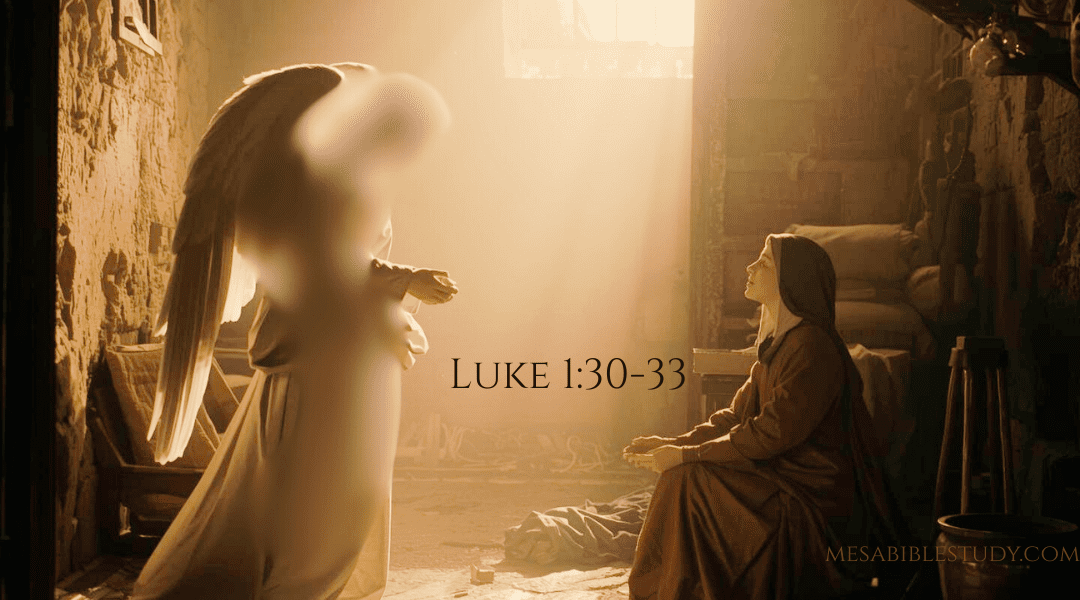
by Jamie Pantastico | Dec 23, 2025 | Devotionals |
🎄 Part 7 — The Promised King Announced: From Eden to David to Christ
Key Text: Luke 1:30–33
“Then the angel said to her, ‘Do not be afraid, Mary, for you have found favor with God. And behold, you will conceive in your womb and bring forth a Son, and shall call His name Jesus. He will be great, and will be called the Son of the Highest; and the Lord God will give Him the throne of His father David. And He will reign over the house of Jacob forever, and of His kingdom there will be no end.’”
Devotional: The Angel’s Announcement and God’s Unbroken Promise
Theme Connection:
- Genesis 3:15 promised a coming Seed who would crush the serpent.
- Abraham preserved the Seed through a chosen family.
- David was promised an eternal throne and kingdom.
- Isaiah foretold the virgin birth and divine identity of the Child.
- The Virgin Shall Conceive (Isaiah 7:14)
- The Birthplace Foretold (Micah 5:2)
Luke 1:30–33 is where all of those promises converge.
This is not merely a birth announcement.
It is a covenant confirmation.
Context & Connection
When the angel Gabriel appeared to Mary, he did not speak in vague or sentimental language. He anchored his message in the very promises God had been making for thousands of years.
Gabriel’s words are deliberate, precise, and deeply rooted in Scripture:
- A Son will be born
- He will be great
- He will be called the Son of the Highest
- He will receive the throne of David
- He will reign over the house of Jacob
- His kingdom will be everlasting
This is 2 Samuel 7 spoken again — now attached to a name, a person in Mary, and a moment in history.
Devotional Insight
1. “Do not be afraid… you have found favor with God.”
God’s redemptive plan does not begin with fear, but with grace.
Mary did not earn this role.
She was chosen by God’s sovereign favor.
This reminds us that redemption has always been God’s initiative — from Eden to Nazareth.
2. “You will conceive… and bring forth a Son.”
This echoes Genesis 3:15 — the Seed of the woman.
The Redeemer would come through a woman, not through human strength or planning, but by divine intervention.
Christmas is not man reaching up to God.
It is God reaching down to man.
3. “The Lord God will give Him the throne of His father David.”
This is the heart of the announcement.
Gabriel does not reinterpret the Davidic Covenant.
He confirms it.
This Child is the rightful heir to David’s throne — the King promised in 2 Samuel 7:12–17.
This is not symbolic language.
It is covenant language.
Jesus is not merely a spiritual figure —
He is Israel’s promised King.
4. “He will reign over the house of Jacob forever.”
This is critical.
Gabriel does not say “over the Church.”
He does not say “over a spiritualized Israel.”
He says the house of Jacob.
God has not forgotten Israel.
God has not replaced Israel.
God is fulfilling His promises exactly as He spoke them.
The kingdom promised to David will be fulfilled by David’s greater Son.
5. “Of His kingdom there will be no end.”
Earthly kingdoms rise and fall.
Human rulers come and go.
But this King’s reign is eternal.
What began in a womb will one day rule the world.
The manger points forward to a throne.
The Child points forward to a crown.
The first coming guarantees the second.
Encouragement for Today
Luke 1:30–33 reminds us of a powerful truth:
God has never deviated from His plan.
From Eden to Abraham, from David to Mary, God has been moving history toward this moment — and beyond it.
The birth of Christ is proof that:
- God keeps His promises
- God honors His covenants
- God is faithful across generations
And because Christ has come once exactly as promised, we can trust Him to come again.
Christmas is not the end of the story.
It is the confirmation that every word God speaks will stand.
Reading Plan
- Genesis 3:15 — The promised Seed
- 2 Samuel 7:12–17 — The promised throne
- Isaiah 9:6–7 — The promised King
- Luke 1:30–33 — The announcement fulfilled
- Revelation 11:15 — The kingdom established
← Previous | 📖 Series Home | Next→
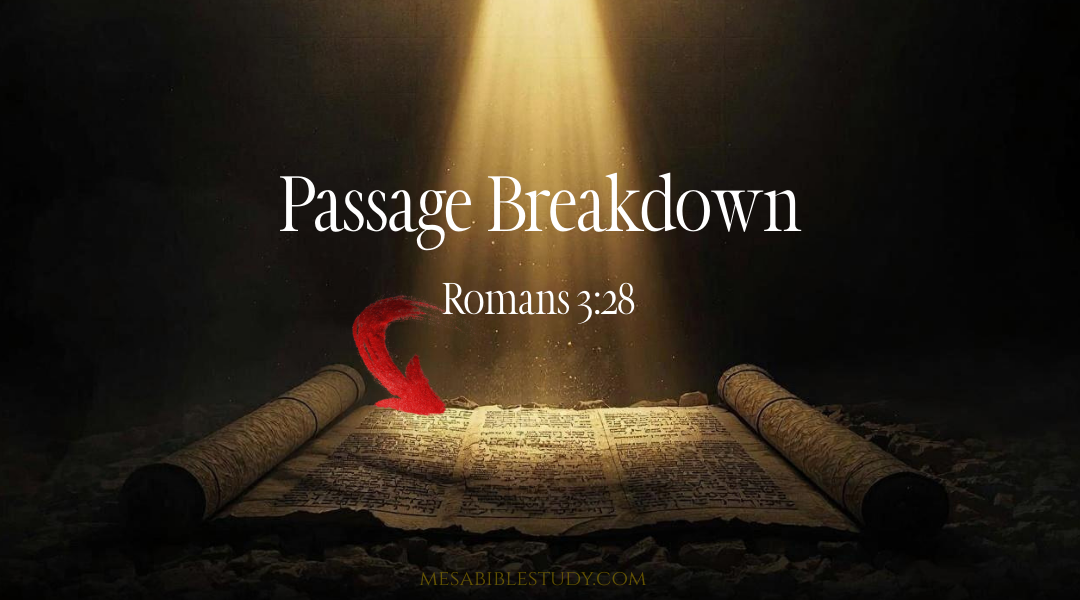
by Jamie Pantastico | Dec 23, 2025 | Verse-by-Verse Bible Studies |
📖 Passage Breakdown — Romans 3:28
“Therefore we conclude that a man is justified by faith apart from the deeds of the law.”
📜 Background, Setting & Purpose
✍️ Author
Paul the Apostle, writing under the inspiration of the Holy Spirit.
👥 Written To
Believers in Rome — a mixed body of Jews and Gentiles in the Body of Christ.
⏲️ When
~A.D. 57, near the end of Paul’s third missionary journey, likely from Corinth.
🌍 Setting & Purpose of Romans (book-level)
Romans is Paul’s doctrinal masterpiece. It lays out:
- The universal guilt of mankind
- Justification by faith alone
- The imputation of righteousness
- The believer’s position in Christ
- God’s plan for Jew and Gentile in this age
Romans answers the greatest question of all:
How can a holy God declare guilty sinners righteous?
📖 Immediate Context (Romans 1–3)
Before Paul ever gets to Romans 3:28, he destroys every human escape route.
- Romans 1 — Gentiles are guilty
- Romans 2 — Jews are guilty
- Romans 3 — All are guilty
Paul’s verdict is unmistakable:
“There is none righteous, no, not one…”
“There is none who seeks after God…”
“There is no fear of God before their eyes.”
Humanity is not “almost saved.”
Humanity is condemned, helpless, and silent before God (Rom 3:19).
✨ Phrase-by-Phrase Breakdown
“Therefore…”
This is one of the most important therefores in Scripture.
It reaches back to everything Paul has just proven:
- All are under sin
- No one meets God’s standard
- The Law condemns rather than saves
- Every mouth is stopped
- The whole world stands guilty before God
“Therefore” means Paul is about to draw an unavoidable conclusion.
You cannot skip this word without skipping the logic of grace.
“we conclude…”
This is not speculation.
Not opinion.
Not theological guesswork.
“We conclude” means:
- The evidence has been presented
- The case has been argued
- The verdict is in
Paul is saying, in effect:
“Given everything God has revealed, this is the only possible conclusion.”
Grace is not an emotional idea — it is a judicial necessity.
“that a man is justified…”
Justified is a legal term, not a feeling.
It means:
- Declared righteous
- Acquitted
- Cleared of all charges
- Given a right standing before God
Not made righteous by works.
Not kept righteous by effort.
But declared righteous by God Himself.
“by faith…”
Faith is not a work.
Faith is not merit.
Faith is not obedience.
Faith is trust — resting in what God has done.
Specifically, faith in:
- The shed blood of Christ (Rom 3:25)
- His death
- His burial
- His resurrection
Faith receives. Works attempt to earn.
“apart from the deeds of the law.”
This phrase eliminates every form of human contribution.
“Apart from” means:
- Without
- Separate from
- Excluding
- Independent of
Not circumcision.
Not commandments.
Not repentance-as-works.
Not obedience.
Not law-keeping of any kind.
The Law has zero role in justification — for Jew or Gentile.
❌ What This Verse Does Not Mean
- Not that the Law is evil
- Not that good works are meaningless
- Not that obedience has no place in the believer’s life
- Not that faith must be completed by works to justify
Paul is speaking specifically about justification, not Christian living.
✅ What It Does Mean
- Justification is by faith alone
- Works contribute nothing to salvation
- God saves the ungodly (Rom 4:5)
- Eternal life is a free gift, not a wage
- The cross fully satisfied God’s justice
- Grace is not conditioned on human performance
This is the heartbeat of the gospel of grace.
🔗 Cross-References for Going Deeper
Romans 3:19–20 — The Law condemns all
Romans 3:21–26 — Righteousness revealed apart from the Law
Romans 4:4–5 — Faith contrasted with works
Galatians 2:16 — Justified by faith, not works of the Law
Ephesians 2:8–9 — Salvation by grace through faith
Titus 3:5 — Not by works of righteousness
🙏 Devotional Summary
Romans 3:28 is God’s verdict over a guilty world. After proving that no one seeks God, no one does good, and no one can stand justified by obedience, God does something breathtaking — He offers righteousness as a gift. You are not asked to earn His favor, clean yourself up, or prove your worth. You are asked to believe. Faith alone, in Christ alone, apart from works — this is not leniency; it is mercy grounded in justice. The cross did everything the Law could never do.
Bottom line:
After mankind failed completely, God concluded graciously.
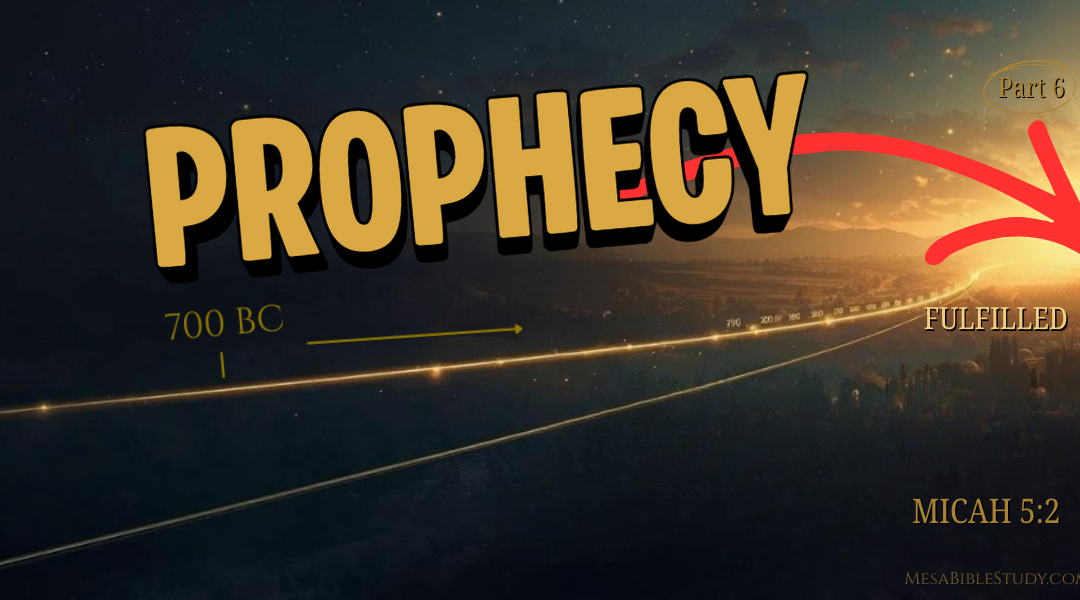
by Jamie Pantastico | Dec 22, 2025 | Devotionals |
🎄 Part 6 — The Birthplace Foretold: Bethlehem, the City of the Redeemer
Key Text: Micah 5:2
But you, Bethlehem Ephrathah…
Though you are little among the thousands of Judah,
Yet out of you shall come forth to Me
The One to be Ruler in Israel…”
Devotional: Bethlehem — The Humble Birthplace of the Eternal King
Theme Connection:
Part 5 revealed who the Messiah is — fully God and fully Man, the Child born and the Son given.
Part 6 reveals where He would enter the world — a detail God pinpointed 700 years before Christ’s birth.
The Redeemer would not appear in Rome, Athens, or Jerusalem…
but in a small, obscure village called Bethlehem Ephrathah.
Context & Connection
Micah prophesied during a time of national corruption, looming judgment, and spiritual decline. Yet in the middle of this darkness, God delivered a precise prophecy about the coming King:
“But you, Bethlehem Ephrathah…
Though you are little among the thousands of Judah,
Yet out of you shall come forth to Me
The One to be Ruler in Israel…”
This is astounding.
God bypassed every prominent city and chose one of the smallest towns in Judah — Bethlehem.
The same Bethlehem where:
- Rachel was buried (Genesis 48:7)
- Ruth met Boaz (Ruth 1–4)
- David was anointed king (1 Samuel 16)
The city of David would become the birthplace of the Son of David.
Devotional Insight
1. Bethlehem: Small in Man’s Eyes, Chosen in God’s Plan
“Little among the thousands of Judah…”
Bethlehem was tiny, insignificant, easy to overlook.
And that is precisely why God chose it.
God delights in using what the world considers small to reveal His greatness.
The glory of Christ’s birth wasn’t in the prestige of the place —
it was in the purpose of the One born there.
2. “Out of you shall come forth to Me…” — God’s Chosen King
God wasn’t merely predicting a location.
He was announcing the arrival of His King, the rightful Ruler of Israel.
This ties directly to:
- The Abrahamic Covenant — the Seed
- The Davidic Covenant — the King
- Isaiah’s prophecy — the virgin birth
Bethlehem connects all the threads of Scripture into a single point in history.
3. “Whose goings forth are from of old, from everlasting.” — His Eternal Nature
This is breathtaking.
Micah declares the One born in Bethlehem is not beginning in Bethlehem.
He is:
- eternal
- uncreated
- divine
- existing from everlasting
This is a direct statement of Jesus’ deity.
The Child born in Bethlehem is the eternal Son who existed before Bethlehem ever did.
As Jesus Himself said:
“Before Abraham was, I AM.” (John 8:58)
Encouragement for Today
The prophecy of Bethlehem reminds us:
- God keeps every detail of His Word.
- Nothing is accidental in His plan.
- He works through unexpected people, places, and moments.
- His promises are exact — not vague or symbolic.
If God orchestrated the birth of Christ down to the very town, you can trust Him to orchestrate the details of your life as well.
Bethlehem tells us God is faithful, God is intentional, and God is with us.
The Redeemer came just as He promised —
and He will come again just as He promised.
Reading Plan
- Micah 5:2 — The birthplace prophecy
- Matthew 2:1–6 — The fulfillment in Bethlehem
- Luke 2:1–7 — The birth of Christ
- John 7:42 — The people recognizing Bethlehem’s prophetic role
Explore the Series
← Previous | 📖 Series Home | Next→
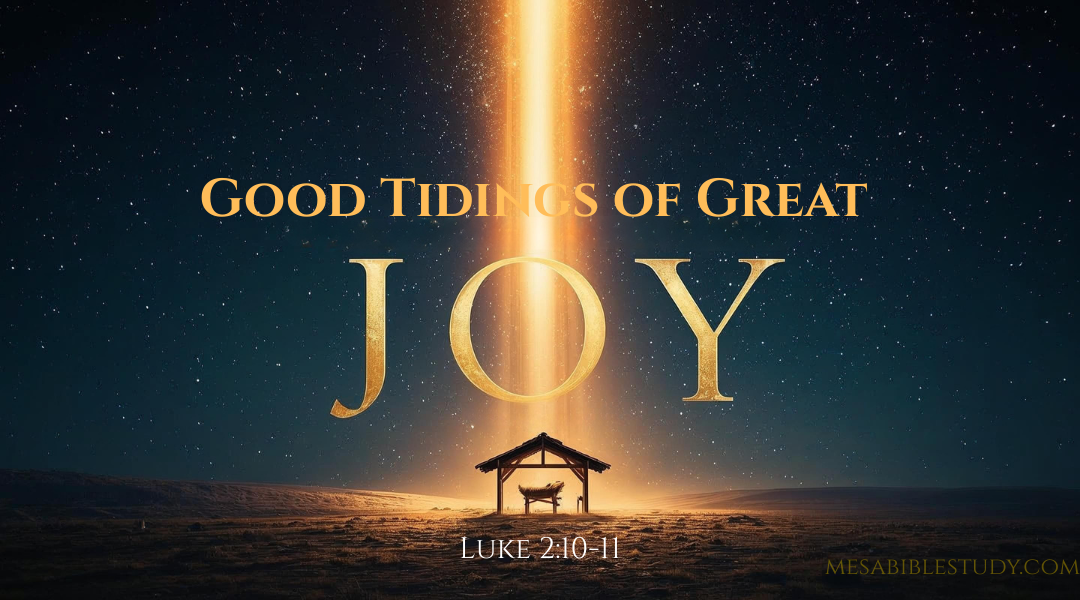
by Jamie Pantastico | Dec 21, 2025 | Devotionals |
Devotional: Good News That Changes Everything
Luke 2:10–11
“Then the angel said to them, ‘Do not be afraid, for behold, I bring you good tidings of great joy which will be to all people. For there is born to you this day in the city of David a Savior, who is Christ the Lord.’”
Context & Connection
Luke 2 opens on an ordinary night with ordinary men—shepherds watching their flocks in the fields. They weren’t powerful. They weren’t influential. They weren’t expecting anything extraordinary.
And then heaven broke the silence.
Before the angel announces a Savior, he addresses the very thing gripping their hearts—and ours:
“Do not be afraid.”
Fear has always been humanity’s default response in a fallen world. Fear of the unknown. Fear of loss. Fear of judgment. Fear that God might be distant or displeased.
But the angel doesn’t bring a warning.
He brings good news.
And not just good news—great joy.
Phrase by Phrase Breakdown
“Do not be afraid”
The first words spoken are words of comfort. God does not begin with condemnation, but reassurance. The arrival of Jesus is not something to fear—it is something to rejoice in.
“for behold”
This is a call to pay attention. Heaven is saying, Stop. Look. Listen. Something history-altering is happening.
“I bring you good tidings of great joy”
Not temporary happiness. Not shallow relief.
Great joy—deep, lasting joy rooted in what God has done, not in changing circumstances.
“which will be to all people”
This good news is not limited by ethnicity, status, background, or past failures. Shepherds heard it first to prove that no one is excluded.
“For there is born to you this day”
Notice the personal language: to you.
Salvation is not abstract. It is intimate. Immediate. Personal.
“a Savior”
Humanity didn’t need advice—it needed rescue.
Jesus came not to reform us, but to save us.
“who is Christ the Lord”
He is both Israel’s promised Messiah (Christ) and the sovereign ruler (Lord).
The One lying in a manger rules heaven and earth.
Devotional Insight
Luke 2:10–11 reminds us that the gospel begins with joy, not fear.
Jesus did not enter the world announcing judgment—He entered announcing salvation. The angel’s message reveals the heart of God: He wants people to know they are invited, loved, and saved.
Joy is not found in perfect circumstances.
Joy is found in a perfect Savior.
And because this joy is anchored in who Christ is and what He has done, it cannot be stolen by hardship, sorrow, or uncertainty.
The world may feel heavy—but the gospel is still good news. Fear may shout—but joy has already been declared.
Encouragement for Today
Whatever you’re carrying this morning—fear, grief, exhaustion, uncertainty—hear heaven’s words again:
Do not be afraid.
Why?
Because a Savior has been born to you.
Joy has entered the world.
Hope has a name.
And His name is Jesus.
That truth has never changed—and it never will.
📖 Reading Plan
Isaiah 61:1 – Good tidings proclaimed to the brokenhearted.
John 1:12 – As many as received Him, to them He gave the right to become children of God.
Romans 5:1–2 – We rejoice in hope through our Lord Jesus Christ.
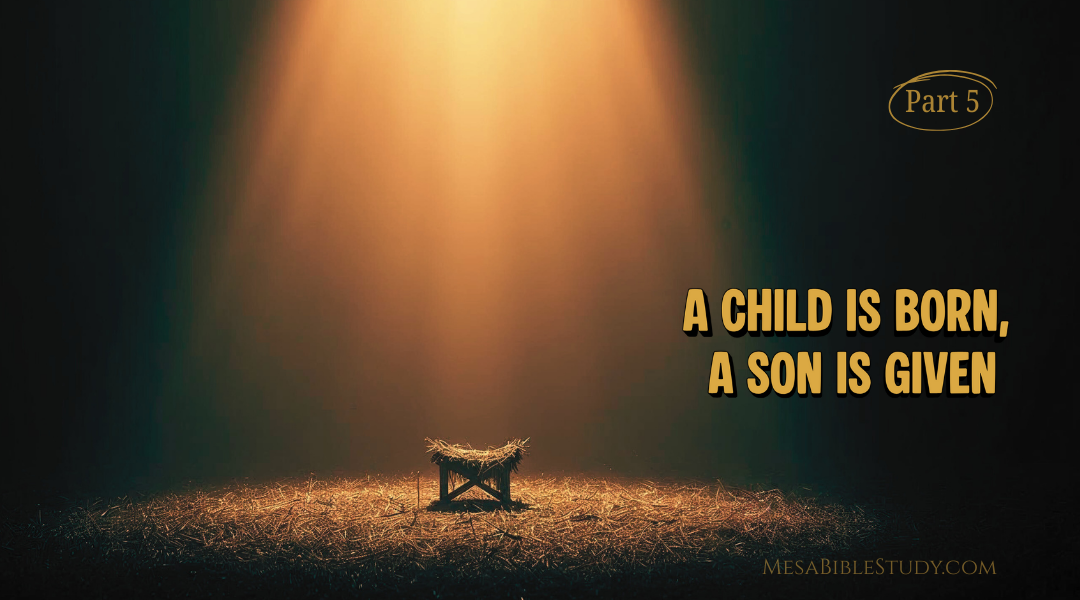
by Jamie Pantastico | Dec 20, 2025 | Devotionals |
🎄 Part 5 — A Child Is Born, a Son Is Given: The Dual Nature of the Messiah
Key Text: Isaiah 9:6
“For unto us a Child is born,
Unto us a Son is given;
And the government will be upon His shoulder.
And His name will be called
Wonderful, Counselor, Mighty God,
Everlasting Father, Prince of Peace.”
Devotional: The Identity of the Promised Messiah
Theme Connection:
Part 4 revealed how the Redeemer would enter the world — through a virgin birth.
Part 5 reveals who this Redeemer truly is — a Child in humanity, yet the eternal Son in deity.
Christmas is not just the birth of a baby.
Christmas is the arrival of God in flesh.
Context & Connection
Isaiah wrote these words 700 years before Christ’s birth in Bethlehem. Israel was surrounded by threats, weighed down by sin, and longing for hope. Into that darkness, God spoke a promise of light, life, and a coming King.
But this King would be unlike any the world had ever known.
Isaiah divides the prophecy into two lines:
- “Unto us a Child is born” — His humanity
- “Unto us a Son is given” — His deity
This is the miracle of the incarnation —
fully man, fully God, one Person forever.
Devotional Insight
1. “Unto us a Child is born…” — The Humanity of Christ
Jesus was born — truly born.
He grew.
He learned.
He walked.
He wept.
He felt sorrow, hunger, fatigue, joy, and pain.
He became one of us so He could save us.
The Child born in Bethlehem was:
- the Seed promised to Eve
- the Son promised to Abraham
- the King promised to David
- the Immanuel promised in Isaiah 7
His humanity makes Him our perfect representative.
2. “Unto us a Son is given…” — The Deity of Christ
Notice: the Son is not born — the Son is given.
The Child had a beginning in Bethlehem.
The Son had no beginning.
He is eternal, uncreated, deity.
This matches:
- John 1:1 — “In the beginning was the Word…”
- John 1:14 — “The Word became flesh…”
- Micah 5:2 — “Whose goings forth are from everlasting.”
The One given is the eternal Son of God —
God in flesh, wrapped in humanity.
3. “And the government will be upon His shoulder…” — The Future Reign
This looks forward to Christ’s literal, earthly rule on David’s throne during the Millennial Kingdom.
The baby in the manger is the King who will rule the nations (Isaiah 9:7; Luke 1:32–33).
Jesus is not only Savior.
He is Sovereign.
He is the rightful King of Israel and the world.
4. “…Wonderful, Counselor, Mighty God, Everlasting Father, Prince of Peace.”
These titles reveal who the Child truly is:
Wonderful
Beyond comprehension — miraculous in all His ways.
Counselor
Perfect wisdom — God’s revelation embodied.
Mighty God
Not “a god.”
Not “godlike.”
God Himself. This is a declaration of deity.
Everlasting Father
The Source of eternity — the One who gives eternal life.
Prince of Peace
The One who reconciles man to God — and who will bring peace to the world at His return.
Encouragement for Today
This Christmas season, let Isaiah 9:6 remind you:
The Child born in Bethlehem is the eternal Son given for your redemption.
He understands your humanity.
He possesses all divine authority.
He is your Savior, the Head of the Body, King of kings, your peace, and your everlasting hope.
Christmas is not only about His birth —
it is about His identity.
And because of who He is, every promise of God is secure.
Reading Plan
- Isaiah 7:14 — The virgin birth
- Luke 2:1–14 — The Child is born
- John 1:1–14 — The Son is given
- Revelation 19:11–16 — The King returns
Explore the Series
← Previous | 📖 Series Home | Next →




